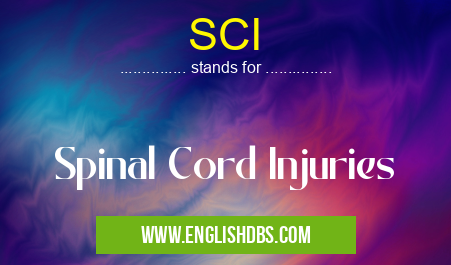What does SCI mean in PHYSIOLOGY
Spinal Cord Injuries (SCI) are serious injuries that affect the spinal cord, the bundle of nerves that sends signals from the brain to the rest of the body. These injuries can result in loss of sensation, movement, and other functions below the level of the injury.

SCI meaning in Physiology in Medical
SCI mostly used in an acronym Physiology in Category Medical that means Spinal Cord Injuries
Shorthand: SCI,
Full Form: Spinal Cord Injuries
For more information of "Spinal Cord Injuries", see the section below.
» Medical » Physiology
What does SCI Stand for?
SCI stands for Spinal Cord Injuries.
SCI Meaning in MEDICAL
In medical terminology, SCI refers to injuries that damage the spinal cord, including:
- Complete SCI: A complete injury damages all nerve fibers in the spinal cord at the level of the injury, resulting in paralysis and loss of sensation below the level of the injury.
- Incomplete SCI: An incomplete injury damages some, but not all, nerve fibers in the spinal cord, resulting in varying degrees of paralysis and sensory loss.
- Cauda equina syndrome: A type of incomplete SCI caused by damage to the bundle of nerve roots at the bottom of the spinal cord, leading to loss of leg function and bowel and bladder incontinence.
Essential Questions and Answers on Spinal Cord Injuries in "MEDICAL»PHYSIOLOGY"
What are spinal cord injuries?
Spinal cord injuries (SCI) are injuries to the spinal cord, the bundle of nerves that runs from the brain down the back. These injuries can damage the nerves and disrupt the communication between the brain and the body, resulting in a variety of symptoms, including paralysis, loss of sensation, and impaired mobility.
What causes spinal cord injuries?
Spinal cord injuries can be caused by a variety of factors, including car accidents, falls, sports injuries, and other traumatic events that damage the spinal cord.
What are the symptoms of spinal cord injuries?
The symptoms of spinal cord injuries can vary depending on the severity and location of the injury. Some common symptoms include paralysis, loss of sensation, impaired mobility, difficulty breathing, and problems with bladder and bowel function.
How are spinal cord injuries treated?
Treatment for spinal cord injuries typically involves a combination of medical care, rehabilitation, and support services. Medical care may include surgery to stabilize the spine and prevent further damage, as well as medications to manage pain and other symptoms. Rehabilitation aims to help individuals regain function and improve their quality of life. Support services may include counseling, support groups, and vocational training.
What is the prognosis for spinal cord injuries?
The prognosis for spinal cord injuries varies depending on the severity and location of the injury. Some individuals may make a full recovery, while others may experience permanent disabilities. With proper treatment and support, individuals with spinal cord injuries can live full and active lives.
Final Words: SCI can have a significant impact on an individual's life, affecting their mobility, independence, and overall well-being. Understanding the meaning and implications of SCI is crucial for healthcare professionals, researchers, and individuals affected by these injuries.
SCI also stands for: |
|
| All stands for SCI |
